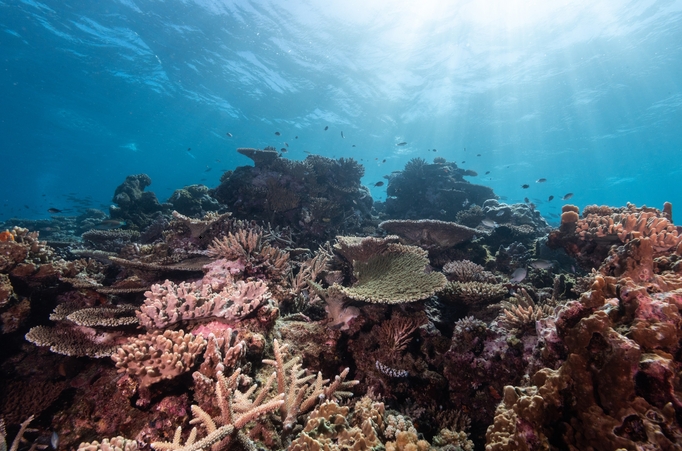An international group of environmental scientists has published a series of important recommendations to protect, conserve and study the world’s coral reefs, the “canaries in the coal mine” of climate change.
An international group of environmental scientists has published a series of important recommendations to protect, conserve and study the world’s coral reefs – the “canaries in the coal mine” of climate change.
The Living Oceans Initiative presented its white paper on the future of vulnerable and important habitats at Thursday’s “Our Oceans” conference in Palau.
Drawing on the expertise of universities and wildlife conservation groups from around the world, including the University of Leicester, the group offers six key recommendations aimed at promoting the “sustainability and survival” of coral reefs.
Projections show that coral reef ecosystems around the world–the key to a vast array of marine species and a source of food, livelihood and cultural heritage for half a billion people–could functionally degrade by 2050 if the goals of the Paris Agreement are not met.
Even with drastic reductions in emissions to keep global warming from exceeding pre-industrial levels by 1.5°C, up to 90 percent of the world’s corals could disappear in the next three decades, leaving behind a reef structure that will lose many of its functions. .
Jens Zinke is a professor of paleobiology at the University of Leicester, whose research examines large coral habitats to track environmental and climate changes over the past three centuries to the present. Speaking about the report he co-authored, Professor Zinke said:
“Coral reefs are the ‘canaries in the coal mine’ when it comes to detecting ecosystems under stress from warming oceans due to climate change. Corals can sense when ocean temperatures exceed a dangerous threshold and warn us when we need to take action.
“Our research has shown that coral reefs have been hit hard by ocean warming over the past three to four decades, but in some reef locations the rate of warming is lower or they are benefiting from mitigating circumstances because of local oceanography.
“Some reefs have the ability to resist or recover from heat stress faster than others, and these reefs may serve as refuges for future warming. It’s an important new line of research to find these places and protect them before they disappear.”
In 2018, the Vibrant Oceans group identified 50 reefs that are most likely to withstand and survive climate change. The habitats are mostly in the Pacific and Indian Oceans, with additional reefs in the Caribbean and eastern Africa.
Previously, the 50 reefs were mostly selected in areas that avoided climate change. Now scientists are calling for an expanded reef portfolio to include sustainable and rapidly recovering reefs.
The group’s latest recommendations, presented in a white paper, “Predicting Climate Reserves for the Future of Coral Reefs,” include:
Continuing the “50 Reefs” approach as “climate change mitigation refuges” as a priority for investments in coral reef conservation.
Expansion of the 50 Reefs Climate Conservation portfolio for coral and coral protection.
Increased support for regional 50 Reefs portfolio condition assessments and sustainable finance initiatives to support regional portfolio implementation.
Increased large-scale, data-driven coral reef monitoring efforts to test and develop new climate reserve models and projections.
Using the latest climate coral reef science to guide investments, especially as climate change impacts accelerate and trigger new ecological stresses and responses among reefs.
Using a far-reaching approach to managing 50 reef sites, including linkages to broader seascapes, managing fisheries and water quality, mitigating other stressors (e.g., industrial development) so that effective and equitable management has measurable benefits for coral reefs. and coastal communities.
” Predicting Climate Reserves for the Future of Coral Reefs ” is available in full from the Wildlife Conservation Society (WCS).
Funding partners for the initial Vibrant Oceans study are Bloomberg Philanthropies , and partners for ongoing conservation work are Oceans 5, the Paul G. Allen Family Foundation, and the Tiffany & Co. Foundation.
Conservation partners are WCS, Rare, The Nature Conservancy, Blue Ventures, and the Ecosystem Conservation Partnership Fund.

